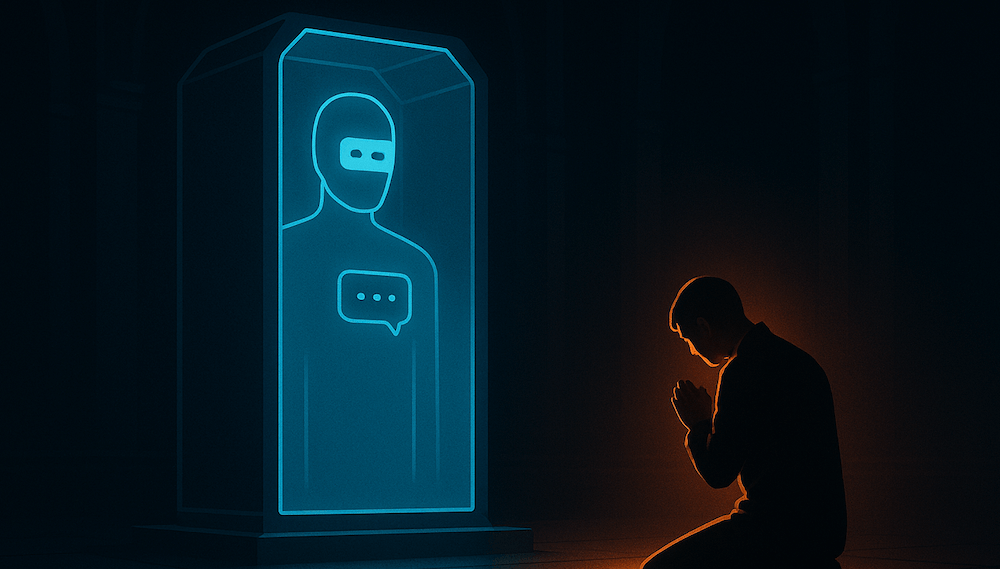
ChatGPT Is Not Your Priest
Posted August 01, 2025
Chris Campbell
Millions are confessing their deepest, darkest secrets not to therapists or priests…
But to a chatbot.
Breakups, breakdowns, regrets, trauma dumps at 3AM. ChatGPT feels safe. Feels like a friend.
But it’s not.
It’s a record-keeping device with a nice bedside manner. And in court, those late-night chats? They’re fair game.
Sam Altman even admitted it: people treat ChatGPT like a therapist—without any of the legal protection.
No HIPAA. No confidentiality. Just you, the AI, and a subpoena away from regret.
There's already a lawsuit trying to unearth chats from millions of users.
Altman says AI chats should be as private as medical records—but “should” isn’t a shield.
The fix? For individuals, it’s simple: encrypted, local AI. No logs. No trail.
But for institutions? That’s where it gets complicated. And exactly where the breakthrough is waiting.
Between a Firewall and a Hard Place
Industries are stuck in a double bind: prove you're playing by the rules by amassing data—but don’t reveal sensitive data in the process.
And here’s the problem: it creates the perfect incentives for mass surveillance.
From medicine to finance to insurance to education…
To prove these industries are following the rules, companies are forced to mass-collect and share sensitive user data with third parties, regulators, and partners.
This creates unnecessary copies of private information, multiplying the risk of leaks, misuse, and breaches.
Even if the original intent was compliance, the data gets repurposed for scoring, targeting, or surveillance. Nothing expires. Everything sticks.
This doesn’t just kill privacy. It kills everything.
Startups can’t afford armies of compliance officers. Researchers can’t access real-world data without legal minefields.
Developers build surveillance into products by default—not because they want to, but because it’s the only way to prove they’re following the rules.
The result? A world where innovation stalls, privacy erodes, and everyone builds for regulators instead of users.
Here’s where it gets interesting… and investable.
While Big Tech scrambles to figure it out, crypto’s ten steps ahead.
Crypto already uses a tool called a zero-knowledge proof, or a “ZK proof.” It’s an incredibly clever—and provable—way to show something is true, WITHOUT revealing the information behind it.
No leaks. No exposure. Just proof.
Why “ZK-Proofs” Are the Future
Think of it like this:
You’re in a bar. You want to prove you’re over 21. Instead of showing your license (with your name, address, and photo), you just flash a card that says: “Verified: Over 21”—and nothing else.
That’s a ZK proof.
Instead of sharing data, you share a proof that the data passed the rules. The math checks out. The other side is satisfied.
No data leaked. No privacy lost. No trust required. The bartender gets the answer they need. You keep your privacy.
It's not magic—it's math that acts like magic.
This gets interesting for compliance.
With ZK, you don’t show the answer. You show a proof that the answer’s legit, without revealing how you got there.
- A hospital can prove it followed proper care procedures without sharing a single medical record.
- A bank can prove it screened you without revealing anything about your account.
- A pharma company can prove a clinical trial’s results were sound without violating HIPAA.
Even better, ZK proofs also make it possible for individuals to hold and prove their own data without sharing it with anyone.
(Many industries, by the way, would prefer this. They don’t want the liability of storing your raw data. It’s expensive, risky, and a legal nightmare.)
And the rub…
Crypto’s been doing this for years. Quietly. While everyone else was still printing PDFs and blacking out sensitive info with Sharpies.
In fact, there are a few crypto projects getting adopted by Big Tech for this exact reason.
ZK isn’t just privacy tech.
It’s the one big shot we’ve got at untangling the regulatory paradox that’s strangling entire industries.
In the age of AI, this becomes all the more crucial.
Right now, James and I are diving deep into this tech… and the big potential winners.
Stay tuned.
